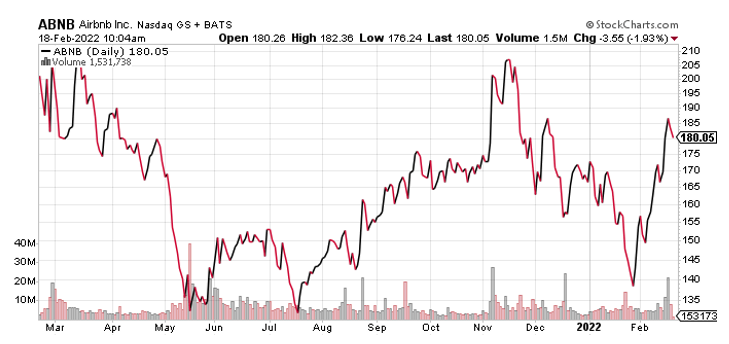Connected networks and data are changing hospitality, and in combination with the economy returning to pre-pandemic norms, it’s a big opportunity for investors.
Last week, Airbnb (ABNB) reported that revenues in the fourth quarter swelled to $1.5 billion, based on 73.4 million nights booked. That marks the company's first-ever quarterly profit.
Shares are still down around 15% from its record levels … but investors should consider checking back in.
The San Francisco–based business gets a bad rap.
Too often, investors mistakenly throw unprofitable West Coast businesses into the same bucket.
They are thought to be more sizzle than steak, with likely losses extrapolated for years. Admittedly, there are many Silicon Valley companies that fit this description … but Airbnb certainly isn’t one of them.
• Airbnb has a sizzling idea: An online marketplace for lodging, primarily homestays … and it’s the best of all worlds.
The company’s software connects travelers and property owners, then takes a commission for the hookup.
There is no inventory, almost an unlimited selection and no muss. It’s purely transactional.
There are other businesses that fit this model. YouTube is one. Amazon.com (AMZN), eBay (EBAY), Mastercard (MA) and Uber Technologies (UBER) are others.
- In every case, the business is putting buyers and sellers together, then skimming a commission off the top. It’s an excellent business model.
Airbnb began in 2008 when Brian Chesky, Joe Gebbia came up with a way to profit from the Bay Area’s tight accommodation market.
They plopped an air mattress on their apartment floor and called this concept an Air Bed and Breakfast.
Related Post: Meet the Metaverse
A year later, they brought in Nathan Blecharczyk to build out the codebase.
Airbnb had venture capital funding by 2009, 10,000 users and 2,500 listings.
That’s when the money started pouring in. Sequoia, Andreessen Horowitz and even Ashton Kutcher invested in the formative years.
By 2015, Tiger Management, Kleiner Perkins Caufield & Byers, and GV (then Google Ventures) were involved as the company expanded globally.
- The real genius of Airbnb is value.
Patrons can often rent an entire apartment for the same rate as rooms at established hoteliers like Marriott International (MAR) or Hilton Worldwide Holdings (HLT).
Shareholders get a great business with operating margins above 80%, and overwhelming scale. That spells out a win.

During the fourth quarter, Airbnb announced revenues swelled 78% year over year to $1.53 billion.
The number of nightly stays increased by 59%, to 73.4 million. And the business is set to improve mightily as the global economy recovers from the pandemic.
- In a letter to shareholders, Chesky noted that the number of listings has swelled to 6 million.
Hosts earned $34 billion in fees during 2021. And business metrics in 2022 should exceed pre-pandemic levels.
There’s a lot of enthusiasm about reopening. … and rightfully so.
Investors expect the hospitality sector will finally return to normal ... and I do, too.
Restaurants will open, airlines will fill their jets and theme parks will swell with adventure seekers. Airbnb is the ultimate reopening investment, and exposure to inflationary pressure is limited.
Restaurants will face higher labor costs. Food prices are rising, too. Airlines are battling rising jet fuel costs. Theme parks face labor shortages.
- But things are different at Airbnb because it operates as a marketplace. It’s an agent.
Shares have come under pressure with the rest of technology. After reaching the $210 level last November, the stock fell all the way back to $135. Shares have recovered some, last trading at $180.07.
At current levels, shares trade at around 186 times forward earnings and around 22 times sales. While these metrics are extreme, they don’t tell the entire story of Airbnb.
Related Post: Raining $ in the Cloud
It’s not hard to see how the business has tremendous scale and leverage.
Although profits amounted to only $55 million in Q4 …
- The company has operating margins of 81%.
The meager profit is due to the network buildout. After 14 years, that process is mature.
Longer-term investors should consider buying shares into any near-term weakness.
Best wishes,
Jon D. Markman


